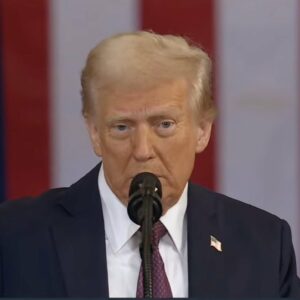For an alternate viewpoint, see Counterpoint: Trump’s Empty Words Ignore the Heavy Price Americans Could Pay for His Presidency.”
The New York Times called it “A Grim Picture of America.”
Politico labeled it “American Carnage, Part 2.”
However, for most Americans, President Trump’s second inaugural address was a positive, hopeful vision of his America First politics. And the days when negative media coverage could convince them otherwise are long gone.
His first sentence said it all: “The golden age of America begins right now.”
Describing a Donald Trump speech as “uplifting” or filled with (apologies to Kamala Harris) “joy” would be a stretch. Trump does optimism the same way President Biden did news conferences — rarely and not very well.
At the same time, it’s hard to deny that the message of his first 24 hours in office was, yes, things are lousy (hey, he’s Trump), but they will get better. We, the American people, can fix them.
“I return to the presidency, confident and optimistic that we are at the start of a thrilling new era of national success, a tide of change is sweeping the country. Sunlight is pouring over the entire world,” Trump said.
And then there was this telling gem:
“I stand before you now as proof that you should never believe that something is impossible to do. In America, the impossible is what we do best.”
It’s a callback to a slogan embraced by the Air Force during World War II: “The impossible we do immediately; the miraculous takes a little longer.”
Yes, Trump rudely criticized the previous president as the poor man sat there, slumped and sour, listening to the litany of policy failures on his watch.
Rather than blaming Biden for every botched job, Trump placed the past four years in a larger and more meaningful context.
“We now have a government that cannot manage even a simple crisis at home,” he said, listing the inept response to the hurricane that hit North Carolina and the incompetent policies that fed the devastating wildfires in California.
By doing so, Trump made his speech about a bigger problem than the Biden presidency. He addressed the growing fear Americans feel that our nation can no longer get things done, that we can’t fix problems, and that we can’t get results.
That’s when Trump made a very non-“carnage” turn: “My recent election is a mandate to … give the people back their faith, their wealth, their democracy, and, indeed, their freedom. From this moment on, America’s decline is over.”
Then Trump started listing his policies and plans to turn things around.
Some were common sense, like reversing the record number of border crossings and ending politically motivated policies attacking U.S. energy production.
Others were, well, crazy: Seizing the Panama Canal? The “Gulf of America”?
But –- and this is what Trump’s critics did not have ears to hear — much of what Trump wants to do is popular.
Listeners who were shocked to hear Trump declare that the U.S. government will now embrace the fact that there are only two sexes, male and female, need to pick up a copy of the New York Times. Its latest poll shows 79 percent of Americans support keeping biological males out of girls’ sports.
On immigration, 88 percent support Trump’s plan for a mass deportation of undocumented aliens with criminal records.
Americans scandalized by Trump’s “extreme” positions need to consider the possibility that they are the “extremists.”
In the end, Trump spent most of his speech talking about victory. His, of course (once again, he’s still Trump). But also the victory he predicts Americans will achieve in the future.
“Above all, my message to Americans today is that it is time for us to once again act with courage, vigor, and the vitality of history’s greatest civilization.”
American carnage? Those could have been the words of Reagan, or Roosevelt, or even Obama.
They could not, however, have been the words of the Donald Trump that America heard eight years ago.
And that’s perhaps the most crucial thing Trump shared with America in the first speech of his new presidency.





